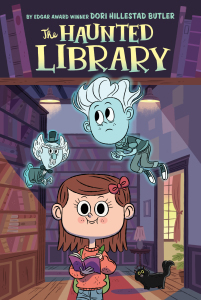Elizabeth Spann Craig's Blog, page 130
September 28, 2014
Write Mysteries for Kids…for the Right Reasons
I write mysteries for kids. I don’t write for this audience because it’s easier than writing for adults. (It’s NOT easier!) I write for this audience because I like it! I like kids. I like kids’ books. I make regular trips to the library to check out new kids books and find out which books are the most popular.
I like to tell stories, but I really like to turn non-readers into readers. Whether they’re non-readers because of ability or interest. As a writer, there’s nothing more satisfying than to receive a heartfelt letter or e-mail that begins, “I never really liked reading before, but then I read your [insert book title here] all by myself.” That’s why I write for kids.
That probably also explains why I write mysteries for kids. Kids who don’t like a lot of other books will often pick up a mystery. Writing mysteries gives me an opportunity to reach the non-reader.
Sadly, I’ve run into a number of writers who want to write for kids for what I think are the wrong reasons.
Some are writers who’ve been writing for adults, but have had a hard time selling recently, so they think they’ll try writing for kids. Because it’s got to be easier, right?
Wrong.
Not unless you really understand the kids market. Not unless you’ve taken the time to read a few hundred children’s books and have honed your skills as a children’s writer.
Others see the success of books like Harry Potter and the Hunger Games and they think there’s money to be made in the kids and/or YA genres. I know a number of children’s book authors who make a modest living at what they do (often after years of study and perseverance), but I’m not sure I know any who are rich. Many of us are able to make a living because we supplement our writing with school visits. In fact, once you’ve sold a book or two in this genre, it’s sort of expected that you will visit schools and talk about how you became an author. But if you don’t like kids or you don’t know how to talk to them, your school visits won’t be very successful.
Still others write for kids because they’ve got an important lesson they want to teach. Do you like to be hit over the head with a moral when you read fiction? Neither do kids. In fact, that’s a good way to turn a kid off reading. Forever.
Honestly, I find it a little bit insulting when someone thinks breaking into the kids market is somehow easier than breaking in to the adult market. There are no shortcuts to publication in any genre. You have to know and understand your market, write a great book that an editor can’t turn down, and persevere. That’s the real secret to publication. In any genre. Perseverance.
Write for kids because you want to, not because you think it’s easy. Write for kids because you like and respect this audience and their books, not because you think you’re going to get rich. Writing for kids is its own reward.
-Dori Hillestad Butler is an award-winning author of more than 40 books for children,  including the Buddy Files, which is a chapter book series about a school therapy dog who solves mysteries. Her books have been on children’s choice and teen award lists in 19 different states. The Buddy Files #1: Case of the Lost Boy won the 2011 Edgar Award for best juvenile mystery. Dori has also been a ghostwriter for the Sweet Valley Twins, Unicorn Club and Boxcar Children series and has written numerous magazine stories, educational materials, plays, book reviews, even characters for one board game and trivia questions for another. She grew up in southern Minnesota, spent the last 19 years in Iowa, and has just recently moved to the Seattle area. Look for her new Haunted Library series for young readers. For more information visit her website at www.kidswriter.com.
including the Buddy Files, which is a chapter book series about a school therapy dog who solves mysteries. Her books have been on children’s choice and teen award lists in 19 different states. The Buddy Files #1: Case of the Lost Boy won the 2011 Edgar Award for best juvenile mystery. Dori has also been a ghostwriter for the Sweet Valley Twins, Unicorn Club and Boxcar Children series and has written numerous magazine stories, educational materials, plays, book reviews, even characters for one board game and trivia questions for another. She grew up in southern Minnesota, spent the last 19 years in Iowa, and has just recently moved to the Seattle area. Look for her new Haunted Library series for young readers. For more information visit her website at www.kidswriter.com.
The post Write Mysteries for Kids…for the Right Reasons appeared first on Elizabeth Spann Craig.
September 27, 2014
Twitterific Writing Links
by Elizabeth S. Craig, @elizabethscraig

Twitterific links are fed into the Writer’s Knowledge Base search engine (developed by writer and software engineer Mike Fleming) which has over 23,000 free articles on writing related topics. It’s the search engine for writers.
Why we need a writing process more than a writing ritual: http://ow.ly/BEH0h @suddenlyjamie
An Australian Digital-Only Publisher Signs Unagented Authors from Around the World: http://ow.ly/C01Mu @Porter_Anderson @stevepvincent
The Challenges of Writing a Sequel: http://ow.ly/BEGSK @StinaLL
5 Reasons Why Your Self-Published Book Isn’t Selling: http://ow.ly/BEHjt @mommifried
15 Essential Films Every Aspiring Screenwriter Must Watch: http://ow.ly/BEGIq @davidcinema
Learning to Love Revisions: http://ow.ly/BEGDg @sherrythomas
Character Talent & Skills: Mentalism: http://ow.ly/BI3b2 @angelaackerman
Balancing your Faith and your Muse: http://ow.ly/BI32B @Shay_Goodman
How to Map Out Your Hero’s Adventure in Your Manuscript: http://ow.ly/BI344 @writersdigest
5 Reasons to Drop ‘Aspiring’ from ‘Aspiring Author’ – Writer’s Edit http://ow.ly/BI3cu
How to Make Social Media Worth Your Time: When Is Enough Enough? http://ow.ly/BI3dp @Janefriedman
“If you breach paywalls, you’re robbing writers.” http://ow.ly/C034n @Porter_Anderson @scratch_mag
10 Ways to Tighten Your Pitch: http://ow.ly/BI31i @wordsprof
6 Tips for Writing Minor Characters: http://ow.ly/BI2WW @robinrwrites
How to Journal Your Way to Published Author Status: http://ow.ly/BI35V @ninaamir
3 things you need to do at the beginning of your novel: http://ow.ly/BI2V6 @writers_write
The Progression of a Writing Life: Rejection – http://ow.ly/BI305 @tspoetry
Book Scams and Other Crimes: http://ow.ly/BI37g @DebraPurdyKong
Strong verbs: http://ow.ly/BI34O @writers_write
5 Tips for Submitting Your Work: Help From an Editor: http://ow.ly/BI39G @Margo_L_Dill
Revision Tips: Revealing Key Information: http://ow.ly/BJ1i1 @kiersi
Digital Revolution Act III: Is Publishing Dying? http://ow.ly/BJ6ub @claudenougat
7 Ways Your Physical Environment Can Help or Hinder Your Writing: http://ow.ly/BJ6ms @aliventure
When Your Concept Disappears: http://ow.ly/BJ6v0 @storyfix
Cover art–same image on different books: http://ow.ly/BJ6o0 @robinrwrites
The Progression of a Writing Life: Strategy – http://ow.ly/BJ6qW @tspoetry
A 3-step writing productivity method: http://ow.ly/BEGrB @cjlyonswriter
Dire Consequences – How to get your characters into trouble: http://ow.ly/BEGPQ @AnthonyEhlers
Self-Publishing a New Edition? Get Rid of the Old One First: http://ow.ly/BEGWU @cathryanhoward
DRM: Dumb or Brilliant? http://ow.ly/BEGFM @HughHowey
The “content flood” in publishing results in slow sales for writers: http://ow.ly/C1Bfc @Porter_Anderson @bob_mayer
18 Common Words to Replace in Our Writing: http://ow.ly/BEGMO @alishuhsaurus
How Has Self-Publishing Changed In The Last 2 Years? http://ow.ly/BEHmT @thecreativepenn @DavidGaughran
What to Expect When You’re Expecting Your First Book Tour: http://ow.ly/BAVLS @llmcneal
Writing the Male POV: http://ow.ly/BAVRD @kayedacus
Does your writing style have bulges? http://ow.ly/BAVsf @RayneHall
The Importance of Comps: http://ow.ly/BAVDn @cathychall
5 Ways to Make Description Work in Your Novel: http://ow.ly/BAVz8 @AnthonyEhlers
How to Write Awesome Kiss Scenes: http://ow.ly/BAVUc @ava_jae
How to Research an Agent: http://ow.ly/BAVoD @ericaverillo
Do your minor characters have their own eccentricities? http://ow.ly/BAV9U @shalvatzis
How to make a reader quickly care about a character: http://ow.ly/BAUXK from The Writing Cafe
Breaking through Writer’s Block: http://ow.ly/BAW2Y @KayKeppler
The Secret to Writing Villains: http://ow.ly/BAVZ1 @emilywenstrom
Fairytale’s Most Wanted: The 5 Most Well-Known Character Types: http://ow.ly/BAUJf @JackHeckel
3 simple ways to get your hero to make a stand: http://ow.ly/ByeKu @amandaonwriting
Is Killing Your Darlings Murdering Your Book? http://ow.ly/ByeSG @robinrwrites
How to Create Walk-On Characters Who Are Memorable (But Not Too Memorable): http://ow.ly/BydJx @KMWeiland
Publishing Is Rotten To The Core: http://ow.ly/BSx4e @DavidGaughran
Plot Your Novel With Mini Arcs: http://ow.ly/ByeuC @Janice_Hardy
4 Steps to Writing Organically: part 1: http://ow.ly/Byehw and part 2: http://ow.ly/Byel4 @melissagmcphail
Publishing Success in the Era of Social Media: Teaming with Fellow Authors: http://ow.ly/Byedj @annerallen
15 Terms Every Indie Author Should Know: http://ow.ly/ByeDV @wiseink
Pretentious Book Snobs: http://ow.ly/Bye9p @impactmagazine
Where to Start Your Story (Exactly): http://ow.ly/ByeHX @mooderino
Uncovering Your Characters’ Deepest Secrets: http://ow.ly/Byeya @NataliaSylv
Tolkien’s 10 Tips For Writers: http://ow.ly/BydLY @writers_write
Tips For Vetting A Book Blogger’s Platform: http://ow.ly/Byer3 @sugarbeatbc
The Real Reason to Write a Book Proposal: http://ow.ly/Bv88A @ninaamir
Option Clauses in Publishing Contracts – friend or foe to an author? http://ow.ly/Bv85S @tinagabrielle
Cadence: Understanding One Quality of Voice http://ow.ly/Bv8ec @jan_ohara
The dangers of flashbacks: http://ow.ly/Bv7Wi @Shirl_Corder
5 Places Writers Can Find Inspiration: http://ow.ly/Bv97R @AlisonPotoma
6 Archetypes Every Novel Needs: http://ow.ly/Bv9bS @BillFerris
Unreliable Narrators: http://ow.ly/Bv8ki @HeatherJacksonW
Big, Beautiful Movies with Sad, Stupid Endings: http://ow.ly/Bv8Pp @speechwriterguy
99 Essential Quotes on Character Creation http://ow.ly/Bv9kv @writingeekery
3 Essential Questions for Better Backstory http://ow.ly/Bv8sb @EmilyWenstrom
5 Essentials for a Successful Writing Retreat: http://ow.ly/Bv8Gj @tweetonsisters
The Character Biography: –Writing more to write less: http://ow.ly/Bv93h @MiaJouBotha
Reassessing what makes our story urgent…and considering the needs of our readers: http://ow.ly/BLMqm @Porter_Anderson
Progressive tense: http://ow.ly/BtLHw @CSLakin
Dealing With Multiple Drafts During Revisions: http://ow.ly/BtLU2 @janice_hardy
12 Writers Who Are Using Google+ in Cool Ways: http://ow.ly/BtLPR @carefulcents
Writing Non-Fiction? Lose the Quotes: http://ow.ly/BtLIN @CalebPirtle
How to Create an Unhappy Ending: http://ow.ly/BtLGw @mythcreants
4 Smart Things Writers Can Learn from Weird Al Yankovic: http://ow.ly/BtLL6 @penprosper1
Banned Books Week – The 10 most challenged titles of 2013: http://ow.ly/BMpjs @writers_write
Great Character: Sarah Connor (“Terminator 2: Judgment Day”): http://ow.ly/BtLZi @gointothestory
5 Ways to Kick Your Writing up a Notch: http://ow.ly/BtLUP @Janice_Hardy
6 Steps Writers Need to Tame the Story Beast: http://ow.ly/BLMdj @DEIrelandAuthor
Plot Wrangling and Highlighter Love: http://ow.ly/BtLQX @Lara_Morgan
World building considerations: cities: http://ow.ly/BtLNa from The Writing Cafe
How Heroes and Villains are Evolving: http://ow.ly/BtLXk @cloudy_vision
Banned Books Week: Celebrating the Freedom to Read: http://ow.ly/BLkBg @LauraMarcella
Juvenile criminals in crime fiction: http://ow.ly/BLkjn @mkinberg
How Chapters Are Built–What to Include, What to Skip: http://ow.ly/BtLRK @writeabook
Music For Writers: Anna Clyne’s Collaborations: http://ow.ly/BKk47 @annaclyne @Porter_Anderson
10 Tips for Shooting Your Own Cover Photo: http://ow.ly/Btglq @janice_hardy @juliemusil
How to Submit Your Writing to Literary Magazines: http://ow.ly/BtgHS @Neon_Lit_Mag
How to Listen to a Famous Author Talk About Writing: http://ow.ly/Btgk0 @LisaCron
Writing Non Fiction As A Side Hustle: http://ow.ly/Bth6R @nloper
8 Proofreading Tools for Beta Readers: http://ow.ly/BtgLd @CKmacleodwriter
Organize Your Writing Project(s) via a Spreadsheet: http://ow.ly/Bth0U @RomanceUniv
The post Twitterific Writing Links appeared first on Elizabeth Spann Craig.
September 25, 2014
Story Signposts
By Elizabeth S. Craig, @elizabethscraig
I find my daughter’s middle school English homework a lot more interesting than she does.
She had a page of notes regarding “signposts” she should be looking for as she reads through various books for school this year. I did some poking around online and found that this material comes from Notice and Note: Strategies for Close Reading by Kylene Beers and Robert E. Probst. The notes were interesting to me, as a writer. For one thing, they pointed out areas that could be problematic for us as we write our books. Here’s what I read in her notes, and my thoughts in italics.
6 signposts:
Contrast and contradictions: When you’re reading and a character says or does something that’s opposite of what they normally do. Asking why the character is doing that action may help you understand character development, internal conflict, and theme. Or—it could be a plot manipulation, if done poorly. Or it could mean a distracted/hurried writer who isn’t maintaining character consistency.
Aha moment: A character realizes, understands, or finally figures something out. If they figured out a problem, you probably learned about the conflict, if a life lesson, then the theme. Potential problem area for writers…when is the “aha moment” occurring? Is it too early in the book? If it’s a mystery, the aha moment really needs to be either a red herring or a revelation about a smaller puzzle in the story.
Words of the wiser: A character pulls over the main character and gives serious advice. You should stop and ask yourself: “What’s the life lesson and how might it affect the character?” It may indicate the theme or internal conflict. Interesting. Have to be careful with this. If the protagonist takes a back seat during this process, this can be a problem.
Again and again: When you notice a word, phrase, object, or situation mentioned over and over. Ask yourself, “Why does this keep showing up again and again?” It may tell you about the theme and conflict, symbolism, or might foreshadow what will happen next. Or it could be similar to Chekhov’s gun…it better mean something if it’s in there. If we’re accidentally repeating ourselves, that needs to be taken care of during revisions. Same with overused words/crutch words. Although I suppose no schoolchildren would think much of my overdependence on “just.”
Memory moment: The author interrupts the action to tell you about a memory. You should ask yourself, “Why might this memory be important?” Tells you more about the theme or conflict or may foreshadow what will happen next. Memories are tricky! Maybe we should ask ourselves the same thing—“Why might this memory be important?” If it’s not essential to character development or plot, it probably needs to be axed.
Tough questions: The character asks himself a really difficult question that reveals his or her inner struggles. Stop and ask yourself, “What does this question make me wonder?” Tells about conflict, might foreshadow what will happen next. I’m thinking this better be in dialogue with another character or else internalized worrying expressed a bit differently.
Reading through these again, though, I’m realizing that I’ve used all of these in my mysteries from time to time. Carefully. A sleuth trying to elicit information from a suspect may use contradiction. The aha moment is vital for red herring discovery (and, if you’re a mystery writer and have an aha moment that points to a clue…you’d better be pretty close to the end of the book. Otherwise, the clue should slip under the radar and not be an aha at all). Insight is often given my sleuths by observant onlookers or sidekicks (sometimes accidentally). I do repeat thematic elements…over the course of a series, though, since I want the series to have a theme more than individual books. Memories involving the victim are vital to mysteries. And…sure, I’ve used the tough questions thing too, although it’s more of the “dark night of the soul” moment that we see in scriptwriting structure.
Do you recognize any of these story signposts in your own writing? Are you more interested in your child’s English homework than they are? :)
Image: MorgueFile: Alvimann
The post Story Signposts appeared first on Elizabeth Spann Craig.
September 21, 2014
6 Steps Writers Need to Tame the Story Beast
by D.E. Ireland, @DEIrelandAuthor 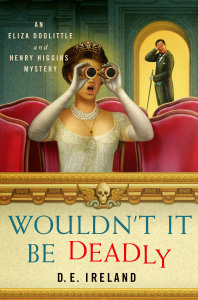
If you’ve come with up a unique idea for a book, congratulations. But you may need advice on how to shepherd this idea from that first inspiration to typing the last line of your final draft. Here are six steps that can help you along the way.
First you need a light bulb moment. An idea pops in your brain, you say, “what if…?” and off you go to develop the premise. It’s perhaps the most exciting part of writing. Then reality sets in. We came up with the novel idea of Eliza Doolittle solving mysteries with Henry Higgins. But we first had to ascertain whether Shaw’s characters were in the public domain (yes, thankfully) and steer clear of Lerner & Loewe’s film My Fair Lady, which isn’t.
Write down that premise before the idea floats away. Otherwise another writer will eventually pluck it out of the ethereal domain and make it their own. Discuss it to death if you have a writing or critique partner. Is it workable, or the stupidest thing you’ve ever come up with in your career? Writing hours are precious, so don’t waste time on an idea that will end up going nowhere. We knew Eliza and Higgins would be an entertaining pair of amateur sleuths, and that London in 1913 would make it even better. We just needed a plot, murder victims, red herrings, clues, and suspects. Oh, and a killer with a motive.
Expand the premise into a paragraph or a page. Let your creative juices flow. If you aren’t in a writing team, find someone who can act as a sounding board. Not your children, your mother, or your spouse. You don’t need a yes-man, you need another writer who understands the process of fleshing out a story. We (the first time working as D.E. Ireland) spent days going over story possibilities, and then another few weeks reading and rereading G.B. Shaw’s Pygmalion along with countless hours researching Edwardian London.
After a month or two of brainstorming, you should be ready to outline. We’ve both written books by the seat of our pants and it can be an exhilarating process. Other times, it feels like you’re driving across the country without a map or highway signs to give you any direction. And you may end up in a roadside pit of despair. Not having an outline can seriously prolong the writing of the manuscript – something you can’t afford when working on deadline.
As for the outline’s length, at least ten to fifteen pages are average – although the outline for our second book clocked in at twenty-eight pages single-spaced! If you can’t wring out at least ten pages for the outline, then the plot is short story material, not a novel.
An outline is a great opportunity to throw down everything possible about the plot. Better to have too much story than not enough. And keep in mind most mystery editors prefer 85,000 words or around 315 pages max. So a fifty-page outline may be telling you that the story idea is better suited for a saga like Outlander or Game of Thrones. Our outline for Wouldn’t It Be Deadly was eighteen pages, which translated into a twenty-page synopsis for our proposal package. However, we nabbed our agent with a one-paragraph query three hours after sending it off. And he roped in a 2-book contract within three weeks. Nice.
After the outline, we hammered out the first draft of Book One more slowly, due to other projects and life in general. Although we sold the manuscript quickly, we still had a final draft to complete. Once we turned it in, our editorial revisions were easy and few. Then again, we both have editing experience and are grammar and spelling Nazis, as well as research hounds.
For our second Eliza Doolittle/Henry Higgins book, we managed to get the entire first draft done between late January and late April – pushing ourselves to finish before we left for Malice Domestic in early May. Then came revisions, far more painful this time due to the necessity of cutting 50 pages before we began editing. Ouch. Sometimes you have to let certain things go.
Final revision time is like dress rehearsal. Is everything working: lines, costumes, the performances of your characters. We exchange chapters to read over, using ‘track changes’ in Word. Eventually we agree on a final draft. Done? Hardly. Reading the manuscript aloud is a handy but invaluable device, and takes another week to finish. But we catch plenty of extra spaces, punctuation fails, awkward phrases, and misspellings. We take turns reading two pages at a time, which seemed the best length for our read-throughs. A whole chapter proved too exhausting both to read and to listen to for the other partner. We often take breaks, hours or days between, just to keep our sanity intact.
Only then do we attach it to an email and send it off to the editor. There is always a day or two of sheer relief at having survived the process of completing our contract without murdering each other. But we can’t wait to begin again… after a small break, of course. And we have the six steps to help us along the way.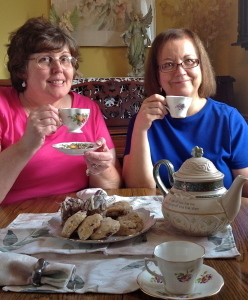
D.E. Ireland is a team of award-winning authors, Meg Mims and Sharon Pisacreta.
Long time friends, they decided to collaborate on this unique series based on George Bernard Shaw’s wonderfully witty play, Pygmalion, and flesh out their own version of events post-Pygmalion. You can find them on:
Facebook
Twitter
Pinterest
BUY LINKS:
Amazon
B&N
The post 6 Steps Writers Need to Tame the Story Beast appeared first on Elizabeth Spann Craig.
September 20, 2014
Twitterific Writing Links
by Elizabeth S. Craig, @elizabethscraig

Twitterific links are fed into the Writer’s Knowledge Base search engine (developed by writer and software engineer Mike Fleming) which has over 23,000 free articles on writing related topics. It’s the search engine for writers.
Think big as you revise your manuscript with these 9 steps: http://ow.ly/Bruvm @onewildword
Bookstores live: Secrets of the stores saving the book world: http://ow.ly/BrujX @salon
The importance of prewriting: http://ow.ly/BI3YG
7 Ways to Expertly Edit Your Own Writing: http://ow.ly/Btfuz @KMWeiland
Spark up Your Story – Adding Suspense, Tension & Intrigue: Handout http://ow.ly/Btg6G @JodieRennerEd
How to publish ebooks: the beginner’s ultimate guide: http://ow.ly/Btfvp @Roz_Morris
Kevin Spacey’s Top 3 Tips For Better Storytelling: http://ow.ly/Btfnh @foxbusiness
Create a rom com storyline in 5 easy steps: http://ow.ly/Btg8T @AnthonyEhlers
3 Easy-to-Use Tools to Count Your Words: http://ow.ly/BtfAj @joebunting
Which is better: – a Facebook page or a Facebook profile? http://ow.ly/BtfxO @ChilledCH
Overcoming perfectionism and finding the love of writing: http://ow.ly/Btg8g @sonyasigler
What Writers Should Know Before Attending a Workshop Retreat: http://ow.ly/Btggy @cynmrom
Using Questions To Expand Your Story: http://ow.ly/Btgb4 @nschmiedicker
4 Techniques of Effective Flash Nonfiction Writers: http://ow.ly/Btfo0 @the_artifice
Trees in Fantasy: Trees as Setting: http://ow.ly/Btgdn @SteffHumm
The Character Debate: Strong and Vulnerable? http://ow.ly/Btgmq @jamigold
Getting graphic with online tools: http://ow.ly/BtgPd @Gwen_Hernandez
Punctuation Personality Types – Which one are you? http://ow.ly/Bth2R @writers_write
Screenwriting Traits: — Flexibility: http://ow.ly/BtgMB @gointothestory
Men as Crit Partners: The Male POV : http://ow.ly/BtgGh @carynmcgill
How to Show Likeable Characteristics in Unlikeable People: http://ow.ly/Btgip @MSaintGermain
8 Marketing Don’ts: Get Real or Get Lost: http://ow.ly/BrtXO @srjohannes
The Difficulty Writers Have with Identity: http://ow.ly/BrthG @losapala
7 ways to beat procrastination: http://ow.ly/BrsU7 @jennaavery
Truth and Consequences of Traditional Publishing: http://ow.ly/BrsJR @DeAnnaMCameron
5 Self-Improvement Tips for Aspiring Writers: http://ow.ly/BrunY @grammarly
Self-Publishing for Graphic Novelists: http://ow.ly/BrtmP @BookWorksNYC
3 things self-published authors need to know about their audience: http://ow.ly/BruPG @chrisrobley
The Surprising Importance of Doing Nothing: http://ow.ly/Bru3W @RLLaFevers
Writing with a Day Job: http://ow.ly/BrtG8 @LoriRaderDay
Self-pub authors gain a store window with arrangement with Nook: http://ow.ly/BFvK2 @Porter_Anderson #FutureChat
Micro Manager vs. Macro Planner: Zadie Smith on the Two Types of Writers: http://ow.ly/BrtPL @brainpicker
How to write a bestselling novel: http://ow.ly/BruJg @guardianbooks
#FutureChat recap: Publishing innovation: http://ow.ly/BEHCE @Porter_Anderson @Roz_Morris
Ruminations on Exclusivity: http://ow.ly/BEH9e @HughHowey
5 Tips for Writing Faster http://ow.ly/BpaqC @NaliniSingh
6 Steps to Writing Success: http://ow.ly/Bpbnx @OrlyKonigLopez
5 Lifelines for Writers with Deadlines: http://ow.ly/BpaD9 @writers_write
Publishers: Base Your Business on Improved Access to Books: http://ow.ly/BEHs5 @Janefriedman Smart Set
A Simple Grammar Trick for Better Fiction: http://ow.ly/Bpb5g @MarcyKennedy
6 Tips for Troubleshooting the Novel : http://ow.ly/Bpb8M @manzanitafire
Awkward Author Photos: A Taxonomy: http://ow.ly/Bp9QT @TheBookMaven
Freelancing: Cold-Pitching a Story? The Secret Is in the Subject Line: http://ow.ly/BpaZ3 @contently
2 Questions Every New Author Asks: http://ow.ly/BpaKi @CaballoFrances
Should I Get an MFA? 27 Writers Weigh In: http://ow.ly/Bpbjm @heydonnelly
14 Questions People Ask Writers: http://ow.ly/BpbbC @nancyjcohen
Principles of storytelling- the inciting incident: http://ow.ly/BpaBL @nownovel
What It Really Takes to be a Writer: http://ow.ly/BpafP @sarahrcallender @writerunboxed
What You See is What You Get: —Describing Fictional Characters: http://ow.ly/Bp9BZ @btmargins
How to pitch a book: http://ow.ly/BkP7g
The Secret Sauce That Turns Stories Into Magic: http://ow.ly/BkPRf @storyfix
What Does Editing Look Like? Behind the Scenes: http://ow.ly/BkPtH @byondpapr
‘The Magrs Method’ for Book Reviewing: http://ow.ly/BkOHz @WorldLitCafe @CarrieGreenBook
Can Students ‘Go Deep’ With Digital Reading? http://ow.ly/BkN16 @mindshiftkqed
A closer look at the mystery genre: http://ow.ly/BkQkX @jenichappelle
Why beta readers are vital to your success http://ow.ly/BkPBt @standoutbooks
Anatomy of a Showdown: http://ow.ly/BkOxj @PAShortt
6 Great Apps to Help You Write: http://ow.ly/BkQdQ @sarahannjuckes
Self-Hosting Your Author Website: Why and How to Do It: http://ow.ly/BkMXI @Janefriedman
3 Techniques to Keep in Mind When Setting the Stage: http://ow.ly/BkPWM @jodyhedlund
Why won’t English speakers read books in translation? http://ow.ly/BkPLd @HephzibahA
Making Sense of Creative Writing’s Job Problem: http://ow.ly/BkOb3 @The_Millions
What to do about a negative review: http://ow.ly/BiBxs @Roz_Morris
The world’s best writers’ retreats: http://ow.ly/BiBJj
An agent on new trends in publishing: http://ow.ly/BiCj1 @MacGregorLit
How to Avoid Head-Hopping: http://ow.ly/BiBE5 @JodieRennerEd
Setting Your Own Standards of Excellence: http://ow.ly/BiCr9 @Author_DFarland
Accents, narrators and total silence: how you hear voices when you read: http://ow.ly/BiBWa @martabausells @guardianbooks
Author @JonathanMaberry ‘s call for author civility and positivity: http://ow.ly/BzdCi #PorterMeets @Porter_Anderson
Writing flashbacks: how to write them well – with examples: http://ow.ly/BiBv2 @standoutbooks
Most Common Writing Mistakes: Telling Important Scenes, Instead of Showing: http://ow.ly/BiBAy @KMWeiland
How to Write a Book: The 5-Draft Method: http://ow.ly/BiBQw @jeffgoins
HarperCollins Adds Another DRM Layer to eBooks: http://ow.ly/ByfRa @thDigitalReader
The Biggest Mistake New Writers Make and 5 Ways to Avoid It: http://ow.ly/BiBkK @annerallen
Konrath on the recent Authors United letter: http://ow.ly/Byf2y @JAKonrath
How Do You Define Credibility and Legitimacy as an Author? http://ow.ly/BiC52 @Martinthewriter
Uninspired? 5 things to try. http://ow.ly/BiBpT @crimsonhouseboo
Bookstore Shelves and Gatekeepers: Why 1 Writer Decided to Self-Publish: http://ow.ly/Bx7xM @charbrentwood
Self-entitled attitudes in crime fiction characters: http://ow.ly/Bvi37 @mkinberg
Benefits of a Pinterest business account: http://ow.ly/BelRH @lalewauthor
Amazon book blurb formula: http://ow.ly/Bel3l @badassmktg
A Quick and Dirty eBook with Calibre | Indies Unlimited http://ow.ly/BemCO
When writing is hard and we don’t want to work: http://ow.ly/Ben9g @andilit
Stop Overthinking and Just Write: http://ow.ly/Bempk @ava_jae
Great Character: Gamora (“Guardians of the Galaxy”): http://ow.ly/Ben3f @gointothestory
How to Be an Author Book Bloggers Will Love: http://ow.ly/BemXF @brrbach
Why Do Women Read More Novels Than Men Do? http://ow.ly/BwiFq @WarrenAdler
Handling deadlines: http://ow.ly/Bemc3 @jimchines
6 Problems With Realistic Space Battles: http://ow.ly/BelwG @mythcreants
The power of showing–writing what upsets us: http://ow.ly/Bvatj @JulieMusil @StephenTremp
Is Self-Publishing for You? Pros and Cons: http://ow.ly/Bv9BS @LyndaRYoung
The Value of “Pantsing : http://ow.ly/BelDn @InkyBites
How to Find Your Character’s Breaking Point: http://ow.ly/Bemkf @KMWeiland
Backlogged? Work Like You’’re Going On Vacation: http://ow.ly/Bemuz @99u
€œThe Libiro Platform Is Serving A Niche Market€�: http://ow.ly/BumG7 @Porter_Anderson @BenGalley
Why Every 1st Novel Should Be a Ghost Story: http://ow.ly/BcGvr @siobhanster
All the links I shared last week: http://ow.ly/Buwj6 . All the links I’ve ever shared (searchable) : writerskb.com .
How Much Should You Charge for Your E-Book? Ask These 7 Questions: http://ow.ly/BcHiO @ticewrites
Writers: How To Let Go Of The Pressure To Be Perfect: http://ow.ly/BcGq6 @writersrelief
So, Are You Working On Your Novel? Or Tweeting About Your Novel? http://ow.ly/BcH3N @NPR @WrknOnMyNovel
How to create your very own personal PR nightmare: http://ow.ly/BcHgO @badassmktg
The post Twitterific Writing Links appeared first on Elizabeth Spann Craig.
September 18, 2014
Prewriting
By Elizabeth S. Craig, @elizabethscraig
My entire family has suddenly become obsessed with pineapple. I don’t know what came over them. It’s like the pineapple fairy visited one night. And they want it fresh. Not canned or frozen (does it even come frozen)?
So…I started out by buying those containers of chopped pineapple at the grocery store deli. But I balked at paying $6 for a smidgeon of pineapple that the family consumed in less than a day.
Then I bought the formidable looking fruit whole. I looked up “how to cut a pineapple” online and the internet immediately coughed up a wiki-How thing with helpful pictures. However, this process involved a bit of brute strength on my part, a couple of very sharp knives (never smart for a clumsy person), and about thirty minutes since I still had to slice out the tough black “eyes” afterward.
I decided I wasn’t the kind of person to spend 30 minutes a day slicing pineapple.
I was back in the grocery store to glumly purchase $6 worth of pineapple when I passed a pineapple slicer at the store. It was $3.99. I bought it and left for home.
I’m not a mechanically minded person. But I tried. I cut the top and bottom off the pineapple, stuck the device on the top, and twisted. The pineapple fell over. I said some unpleasant words to the pineapple and stood it back up. This process repeated itself several times until the top of the pineapple became mush and my ire alerted my husband. He’s a computer engineer, and is definitely mechanically minded.
He carefully read the instructions. Then he experimented with the pineapple and the slicer. Magically, it cored and sliced the pineapple in about 30 seconds. My husband’s technique with everything is thoughtful, deliberate preparation. And everything he attempts goes well…if not on the first try, then on the next.
I’m an impatient person and I jump right in. It was this way for my writing for ages, too. I’d find 5 minutes and tear into the story. I had an idea where I was going, but I’d wander off where the story or characters led me, too.
Sometimes this worked really well. Sometimes it didn’t. The worst was when I ran into a huge issue and I was very close to a deadline. Sometimes I ran into plot holes or character motivation issues or other problems. I marked the manuscript with Word’s highlighter to indicate the moment in the manuscript where I fixed the issue and kept on moving forward (knowing this meant that I’d have to heavily revise the beginning up until that point).
I started trying more and more prewriting before starting new projects. Then I started doing more prewriting before my daily writing, too. I found it helped me clarify where I was going and added character depth to even the random suspects who are one-offs for each book.
This approach helped me write faster and cleaner with more character depth in the first draft. With the conflicting deadlines from several series, I needed the help.
My prewriting before each book:
An outline (very rough). Some call these beat outlines. Mine are sort of like: “and then this happened! And then that happened! And then….”
A character list with names and brief descriptions. As I add more character description, I add it to this list so that I can have some degree of consistency.
A bunch of lists. Lists of potential motives. Lists of possible murder methods. Lists of potential killers. Lists of potential second victims. Lists of settings I might want to use. You get the idea.
And then I jump right in.
Daily prewriting:
I get my head into the story before I sit down in front of the computer to write. While I’m fixing my coffee and letting the dog out in the morning, I’m remembering where I left off and the scenes I’m about to write.
I can still go where the story and the characters lead me. I just have a plan…one that can be deviated from.
How much, if any prewriting do you do (it doesn’t have to include outlining)? Are you a planner? Do you jump right in? Or is it a little of both?
Image: MorgueFile: Pippalou
The post Prewriting appeared first on Elizabeth Spann Craig.
September 14, 2014
Why Do Women Read More Novels Than Men?
by Warren Adler, @WarrenAdler
There is ample statistical evidence showing that adult women read more novels than men, attend more book clubs than men, use libraries more than men, buy more books than men, take more creative writing courses than men, and probably write more works of fiction than men. If, as a demographic, they suddenly stopped reading, the novel would nearly disappear.
A recent perusal of the New York Times fiction best seller list, scoring sales of print and e-books combined, showed that of the fifteen titles listed, eleven were written by women. Indeed, women are the bulwarks of the novel trade. Those statistics could lead one to also believe that the reason for such disparity is that stories told in novels, the characters, plots, insights, inner thoughts, experiences and wisdom offered are skewed to reflect a female point of view.
Even if you take Romance fiction out of the mix, formula romance and its many spinoffs, a surefire product targeted exclusively to women, women readers continue to outpace men. Having even moved into reading categories once considered strictly male turf, women readers and writers today are heavily represented across many genres from science fiction and zombie novels to mystery, suspense, horror, thrillers, military, including a myriad of other sub-genres.
Heroines abound, many created by men, including myself. My mystery series set in Washington D.C., features Fiona Fitzgerald, a female detective, and like Barbara Rose, in The War of the Roses, women emerge in strong roles in my writing. Gender, in my writing process, has little to do with marketing considerations. My creative subconscious and intuition demand it, and I am certain that female writers create male characters for similar reasons, however mysterious. So, most female authors do not write exclusively about women despite the fact that they have an overwhelming female readership.
Whatever publishing discrimination might have existed for women in the past, they obviously do not exist in the present. I’m inclined to believe that women, despite once being held back by education, custom and bias, and restricted to roles primarily as caregivers and nurturers, have surreptitiously dominated the market for novels. The creative urge operates outside the parameters of gender and, despite the restrictions, women have been writing and publishing novels from the moment the form emerged.
In the murky definition where the literary crosses swords with the popular, note the names of these authors; Dickens, Balzac, Bronte, Tolstoy, Lessing, Hemingway, Sands, Eliot, Austen, Proust, Shelly, Faulkner, Joyce, McCullers, Fitzgerald, Cather, Stowe, Wharton, etc., some female and some male. Their stories have been told from the point of view of both genders; stories that are about the human species and not confined merely to an isolated gender.
The gender of a novelist is irrelevant to their creativity. The criterion is talent, a mysterious and extraordinary gift that does not discriminate. A talented female author can find her way into the mind and heart of her male characters just as a male writer can do the same with his female characters. If there is some mythical dividing line between the insight, wisdom, and literary skill between men and women, it is not apparent to me. As for the reasons women dominate the reading market or perhaps the writing profession, I don’t have the answers – I can understand economic and opportunity parity, but not intellectual and artistic parity.
As a reader, I make my selections solely on the basis of which author moves me to enter his or her world, and follow the lives of their characters into the mysteries of their destiny. I hope the readers of my work feel the same way.
Why do you think women read more novels than men? Or will the question continue to baffle, like the mystery of love and attraction?
 Warren Adler is best known for The War of the Roses, his masterpiece fictionalization of a macabre divorce turned into the Golden Globe and BAFTA nominated dark comedy hit starring Michael Douglas, Kathleen Turner and Danny DeVito. In addition to the success of the stage adaptation of his iconic novel on the perils of divorce, Adler has optioned and sold film rights to more than a dozen of his novels and short stories to Hollywood and major television networks. In recent development are the Broadway Production of The War of the Roses, to be produced by Jay and Cindy Gutterman, The War of the Roses – The Children (Permut Presentations), a feature film adaptation of the sequel to Adler’s iconic divorce story, and Capitol Crimes (Sennett Entertainment), a television series based on his Fiona Fitzgerald mystery series.Adler’s forthcoming thriller Treadmill, is officially available. Learn more about Warren Adler at www.Warrenadler.com
Warren Adler is best known for The War of the Roses, his masterpiece fictionalization of a macabre divorce turned into the Golden Globe and BAFTA nominated dark comedy hit starring Michael Douglas, Kathleen Turner and Danny DeVito. In addition to the success of the stage adaptation of his iconic novel on the perils of divorce, Adler has optioned and sold film rights to more than a dozen of his novels and short stories to Hollywood and major television networks. In recent development are the Broadway Production of The War of the Roses, to be produced by Jay and Cindy Gutterman, The War of the Roses – The Children (Permut Presentations), a feature film adaptation of the sequel to Adler’s iconic divorce story, and Capitol Crimes (Sennett Entertainment), a television series based on his Fiona Fitzgerald mystery series.Adler’s forthcoming thriller Treadmill, is officially available. Learn more about Warren Adler at www.Warrenadler.com
The post Why Do Women Read More Novels Than Men? appeared first on Elizabeth Spann Craig.
September 13, 2014
Twitterific Writing Links
by Elizabeth S. Craig, @elizabethscraig
Twitterific links are fed into the Writer’s Knowledge Base search engine (developed by writer and software engineer Mike Fleming) which has over 23,000 free articles on writing related topics. It’s the search engine for writers.
New release last week: Death Pays a Visit is now available. :)
A writer on being plagiarized and how to respond: http://ow.ly/Bc5K5 @TheAubreyRose @passivevoiceblg
5 Cliche Endings: http://ow.ly/Bc5AC @grammarly
5 Ways to Get Book Reviews: http://ow.ly/Bc5xK @SashaLeighS
How to Write a Horror Story: http://ow.ly/Bc5Qz @harrington_jo
A Question to Ask Each Time You Sit Down to Write: http://ow.ly/Bc656 @joebunting
5 Book Pet Peeves: http://ow.ly/BcFZP @thebooksluts
6 Great Apps to Help You Write: http://ow.ly/BcG8P @completelynovel
Casablanca–script analysis: http://ow.ly/BcG2Z @thescriptlab
Quotations From Anne Lamott : http://ow.ly/BcGC6 @DeniseAAgnew
When To Let Go And How To Give Up A Writing Project: http://ow.ly/BcGue @moranchaim
Helpful Hashtags on Twitter: http://ow.ly/BcH5Y @SueColetta1
An Author Website Checklist: http://ow.ly/Bc5X6 @digibookworld
When Not “Earning Out” is a Good Thing: http://ow.ly/Bc5ZA @passivevoiceblg
Breaking Grammar Rules in Poetry: http://ow.ly/Bc6jZ @WritingForward
5 Protagonists Readers Hate: http://ow.ly/Bc5TY @annerallen
Tips for creating voice: http://ow.ly/Bc6ck @katrinakittle @writerunboxed
3 Tips for Getting Published: http://ow.ly/Bc69I @Michelle_Gagnon
The Value of Indie Print: Necessity, Choices and Costs: http://ow.ly/Bc5Cj @janice_hardy
Young People are Reading As much as Adults (Pew Study): http://ow.ly/Bq4qq @Goodereader
Which is Better: First or Third Person Point of View? http://ow.ly/Bo7Zl @jenichappelle
3 Acting Tips for Writing with Emotion: http://ow.ly/BbLjH @MarcieColleen1
Submission Tips for Writers: http://ow.ly/BbLCT @ChuckSambuchino
16 ways to drive a ghostwriter stark raving mad: http://ow.ly/BbLyv @Amabaie
Is your dialogue just characters talking? http://ow.ly/BbLim @standoutbooks
7 Health Tips for Writers Who Don’t Get Enough Exercise: http://ow.ly/BbLEs @QuipsAndTips
What Barnes & Noble is doing wrong: http://ow.ly/Brlvp @HughHowey
How to Write a Clean First Draft: http://ow.ly/BbLAQ @LynneCantwell
How To Use Pre-Orders: http://ow.ly/BbLns @susankayequinn
What 1 writer’s editing process looks like after 20 Novels: http://ow.ly/BbLvK @goblinwriter
Moving cookbooks online: http://ow.ly/Bq4ef @Porter_Anderson @csmcbride @AltaEditions
What is Word of Mouth� in Today’s World? http://ow.ly/Bqo91
Subplots And The Great Swampy Middle: http://ow.ly/BbLmj @woodwardkaren
Famous Writers on the Creative Benefits of Keeping a Diary: http://ow.ly/BbLwY @brainpicker
Crime Writer Karin Slaughter Versus The IRS (what it might mean for writers) http://ow.ly/Bq4vf @forbes @janetnovack
5 Key Things to know about personalizing your query: http://ow.ly/BbLhI @Janet_Reid
How to Make Sure Readers Don’t Close the Book: http://ow.ly/BbLiU @jamigold
The Key Differences Between Middle Grade vs Young Adult: http://ow.ly/BbiFb @marielamba @writersdigest
Clean Up Your Ebook Files With HTML: http://ow.ly/BbiOa @JordanMcCollum
3 Ways to Pare Down Your Prose: http://ow.ly/BbiwE @CKmacleodwriter
8 Writer Tips To Keep Your Butt in the Chair: http://ow.ly/BbiDD @JordanDane
Wattpad for Authors: 14 Tips: http://ow.ly/BbiHC @outaprintwriter
3 Writing Tips from George R.R. Martin: http://ow.ly/BbiBV @A_WritersStudio
On order of adjectives: http://ow.ly/Bbiu4 @xwaldie @slate
Voice and Structure: http://ow.ly/BbiJo @writerunboxed
5 Ways to Intentionally Improve Your Story’s Quality: http://ow.ly/BbiMG @thescalex
3 Things to Know Before Drafting a New Story: http://ow.ly/BbiPf @EmilyWenstrom
Staying in Your CharacterÂ’s’ Shoes: http://ow.ly/Bbirt @mythcreants
The Reader’s Emotional Journey http://ow.ly/BbiAA @DonMaass
Listen to Your Readers: http://ow.ly/BaRBc @birgitte_rasine
4 problems that arise when authors try too hard to evoke emotions: http://ow.ly/BaRt6 @Author_DFarland
The 2 Most Powerful Behaviors of Successful Writers: http://ow.ly/BaRqq @losapala
Script To Screen: “Aliens”: http://ow.ly/BaRyn @gointothestory
5 Things to Know About Writing for Magazines: http://ow.ly/BaRj3 @QuipsAndTips
How to draw a fantasy map: http://ow.ly/BaRdu from Clever Girl Helps
Hooking up the train cars of your story: http://ow.ly/BaRDq @MSaintGermain
Have You Orphaned Your Dialogue? http://ow.ly/BaRml @MarcyKennedy
Plot-driven or Character-driven: Does it Really Matter? http://ow.ly/BjfqV @jenichappelle
The Structure of a Short Story: The First Complication: http://ow.ly/BaRab @woodwardkaren
The ethics of beta reading: http://ow.ly/BaRgr @JordanMcCollum
Avoid Backstory Plot Holes: http://ow.ly/BaRnS @Diana_Hurwitz
R. R. Tolkien’s 10 Tips For Writers: http://ow.ly/BaR3H @galleycat
How to make your book FREE on Amazon (without using KDP Select): http://ow.ly/BgW6a @badassmktg
How to make readers care about an absent character: http://ow.ly/BjhsF @JulieMusil @TraciKenworth
Long flashbacks: http://ow.ly/B8rsm
A closer look: @ReedsyHQ plans to connect authors with editors, designers, and more: http://ow.ly/BjheS @Porter_Anderson @TheFutureBook
5 Ways Transmedia Can Help Scriptwriters: http://ow.ly/B90WM @nmfbernardo @bang2write
Dos and Don’ts of Deep POV: http://ow.ly/BjeHp @jenichappelle
How to Use Layers to Show Intense Emotions: http://ow.ly/B91lO @jamigold
In Praise of Slower Writing: http://ow.ly/B90q4 @RomanceUniv
How to Create a Believable World for Your Characters: http://ow.ly/B98ZU @WCWritingTips
5 Visual Content Tools for Writers (Plus Where to Find Free Photos): http://ow.ly/B90PB @NinaAmir
How To Plot A Character-Driven Story: http://ow.ly/B92pe @DelilahSDawson
9 Rules For Self-Editing: http://ow.ly/BgWeT @raquelbyrnes
10 Things You Don’t Need (To Be A Writer): http://ow.ly/B9270 @DelilahSDawson
5 Ways an Editor is Like a Dentist: http://ow.ly/B90Ah @byondpapr
The Nemesis Character Type in Your Story: http://ow.ly/B90KQ @CSLakin
Writers weigh in on the problem of missing publishing data: http://ow.ly/BgVYC @Porter_Anderson @nmhall @CarlaJDouglas
Balancing Your Writing Career: http://ow.ly/B98VB @StinaLL
Keep an offhand remark on hand: http://ow.ly/B91x6 @JoeMoore_writer
Public appeals in crime fiction: http://ow.ly/BdQYv @mkinberg
Swapping Fiction for Creative Non-Fiction: http://ow.ly/B6Uhb @WritersEdit
Techniques for Sales Success: http://ow.ly/B6Pxa @jamigold
5 Stages of Grief: When Bad Things Happen to Beloved Characters: http://ow.ly/B6P7Q @thebooksluts
Amazon: “The World’s Most Complicated Iceberg” : http://ow.ly/BejTz @Porter_Anderson @craigmod
Negative Capability: Definition and Examples http://ow.ly/B6QoG @epbure
Qualities of a Good Critique Partner: http://ow.ly/BdK88 @alexjcavanaugh
How to Become a Better Writer: http://ow.ly/B6OZo @WritingForward
4 Tips for Writing About Unfamiliar Character Issues: http://ow.ly/BdAIw @JulieMusil
The Right to be Spoiler Free: http://ow.ly/B6P4J @dearauthor
Visual Writing Prompts: The Rule of Three: http://ow.ly/B6Uef @megwolfewrites
8 Ways Authors Can Use Pinterest: http://ow.ly/B6QeK @wordsprof @wherewriterswin
10 Things You Need for a Southern Gothic Horror Novel: http://ow.ly/B6Prj @DelilahSDawson
How to Keep Writing? Break It Down. http://ow.ly/B6PfI @ClaireCookwrite @writerunboxed
Anoint Your Character with Inner Conflict, A Master Technique: http://ow.ly/B6Ql3 @writingeekery
Antagonist Backstory: http://ow.ly/B6Ppi
Your Main Character’s Job Is to Fall into Trouble: http://ow.ly/B6VGj @joanyedwards
12 Reasons to Scrap a Blog Post: http://ow.ly/B23Ne @lindadessau
How To Get Over A Fear Of Failure: http://ow.ly/B23i5 @woodwardkaren
The Difference Between Being Critiqued and Being Edited: http://ow.ly/B22Sx @Aimeelsalter
All the links I shared last week: http://ow.ly/BbLUV . All the links I’ve ever shared (searchable): writerskb.com .
The Hero’s Emotional Midpoint: http://ow.ly/B23Gz @HeatherJacksonW
Sacrifice, Boundaries & Reaching Our Dreams: http://ow.ly/B22Z9 @kristinlambtx
The post Twitterific Writing Links appeared first on Elizabeth Spann Craig.
September 11, 2014
What is “Word of Mouth” in Today’s World?
By Elizabeth S. Craig, @elizabethscraig
I read an interesting post on Sunday. It was from author Pedro Barrento for Indies Unlimited and titled, “Word of Mouth—An Urban Myth?” The post engendered lively comments from other writers. Barrento states: “…word of mouth in literature is a fantasy. It simply doesn’t exist.” He clarifies that he’s not including influencers, Amazon’s recommendation algorithm, etc. as word of mouth. He’s defining it as an actual verbal recommendation. Which, considering it’s called word of mouth, makes sense. He believes that while consumers may be influenced by others’ recommendations for music, they don’t buy long-form products like books based on recommendations. Or, they’re so slow to act on recommendations (slow to purchase, slow to read, slow to pass on a recommendation to others) that word of mouth isn’t a contributing factor to the meteoric success of some of today’s most popular books.
There isn’t (naturally! This is publishing we’re talking about) hard data on how readers discovered the last book they read. So instead, I thought I’d explore what word of mouth is today. I’m thinking that, as times have changed, the way we recommend products to others and influence purchasing has changed.
Word of mouth gets bandied around a lot as being key to sales. But it tends to frustrate writers because how can you spark word of mouth? How do we get people talking about our book? And is word of mouth only verbal in today’s world?
I think word of mouth is changing. I think now that it can mean recommendations from people we trust who share similar tastes. They may not even be people we know personally. To me, word of mouth has become “influence”. And the people who have influence over our buying decisions vary from reader to reader.
I’ve bought books based on recommendations while lurking on Facebook, book blogging sites, and Goodreads. These fellow readers don’t know me, but I know them… at least, I know our taste in books is similar.
What’s a 21st century word-of-mouth? I think that sometimes it is someone telling someone verbally or emailing a friend or family member about a book. I know I buy some of my books for that reason.
I think sometimes it means responding to a friend’s status update on Facebook: Anybody read a good book lately? I know I’ve recommended books in response to those types of updates (usually more than one book). And I know friends of friends have told me they purchased books based on my recommendations.
I think sometimes it means word of mouth from a friend on Goodreads or a book blogger. Maybe someone who is only a virtual friend. Maybe it’s someone who doesn’t even know you exist…but you agree with every one of their reviews and have never been let down when you’ve gotten a book recommendation from them.
I think sometimes it’s almost a viral thing, word-of-mouth. Like the 50 Shades phenom. I heard about that thing at book club, on the news, in the paper, and saw people reading it in doctors’ offices. You really couldn’t escape it. That’s the kind of thing that’s rare. Harry Potter also comes to mind, when it hit it big suddenly (or it seemed sudden to me at the time).
So how can we generate word of mouth? Obviously, the more people who get their hands on our books, the more chances we have that they will tell someone, post it on Facebook, mention it at their book club, or review it on Goodreads.
How do we get our book into the hands of more people? Same approach as always—write many (good) books. Keep prices reasonable and in line with other books in our genre. Maintain a social media presence so readers can find us.
And it’s true—it might take months for a reader’s recommendation of our book to spur another reader to actually purchase it. It might never happen. But, to me, what’s most striking about word of mouth these days is the reach of the recommendation. It has so much more power to influence purchasing than the word of mouth decades ago.
How about you? When you hear about the importance of word of mouth, what goes through your mind? Is word of mouth strictly verbal? Does it include social media? Does it include influencers we don’t have in-person friendships with? Could it even include recommendations from people we don’t know?
And…I had a book release Tuesday. :) Death Pays a Visit is now available.
Image: MorgueFile: TypeXNick
The post What is “Word of Mouth” in Today’s World? appeared first on Elizabeth Spann Craig.
September 7, 2014
4 Tips for Writing About Unfamiliar Character Issues
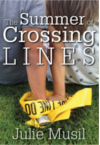
As I plotted my latest release, The Summer of Crossing Lines, I decided to give the main character a stutter. She’d be forced to do some dangerous and questionable things, and I wanted the character to have an extra layer of fear and frustration. My goal was to make this character believable, and to be respectful to people who stutter.
But…I had no experience with stuttering. Lots of research was in order.
If you’re writing about an unfamiliar issue, here are four steps you can take to get it right:
Visit blogs or online diaries. Simply Google your “issue.” One of the most personal aspects of my research involved reading through personal blogs and online diaries of folks who stutter. It gave me profound respect for them and their bravery. It also gave me insight into their personal fears and frustrations. I was able to channel their turmoil when it came to inner dialog. I got a real feel for their view on life and their condition, and how they view the people and the world around them. It also gave me a peek at their lingo.
Research the organizations dedicated to the issue. I spent a lot of time on The Stuttering Foundation web site. They had pages for parents, teens, adults, teachers, etc. This web site gave me a lot of helpful information, including when stuttering develops, what causes it, and ways to cope. It also lists famous people who stutter, including John Stossel, Carly Simon, and the late Marilyn Monroe. I learned that the stutter tends to disappear when the speaker talks quietly, or if they’re acting as a different character–which helped with dialog. Bits of this research made it into my novel.
Read fiction with characters who have the same issue. I searched Amazon for YA stories with a protagonist who stutters. Surprisingly, there weren’t many, which made me realize there was an opening I could fill. I read Tending to Grace, which was a great story. It taught me how to expand on my research and handle technical issues, like how to write a stutter. When we read similar books, we learn how other authors have handled the same situation.
Interview someone with experience. It’s amazing how personal stories can form our perspective. Whatever issue you’re writing about, chances are there’s someone out there who’s willing to share their experiences with you. These experiences can give a glimpse into their world, much like the blogs or online diaries.
Whatever issue we write about, there are plenty of resources available for research. The folks who live with these issues deserve accuracy, respect, and empathy. It’s our job to get it right.
Have you stuttered, or do you know someone else who does? Have you ever written about an unfamiliar issue? What was it? How did you make sure you wrote with accuracy? Any tips you’d like to add?
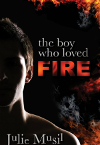
Julie Musil writes from her rural home in Southern California, where she lives with her husband and three sons. She’s an obsessive reader who loves stories that grab the heart and won’t let go. Her Young Adult novels, The Summer of Crossing Lines and The Boy Who Loved Fire , are available now. For more information, or to stop by an say Hi, please visit Julie on her blog , on Twitter , and on Facebook .
The post 4 Tips for Writing About Unfamiliar Character Issues appeared first on Elizabeth Spann Craig.

